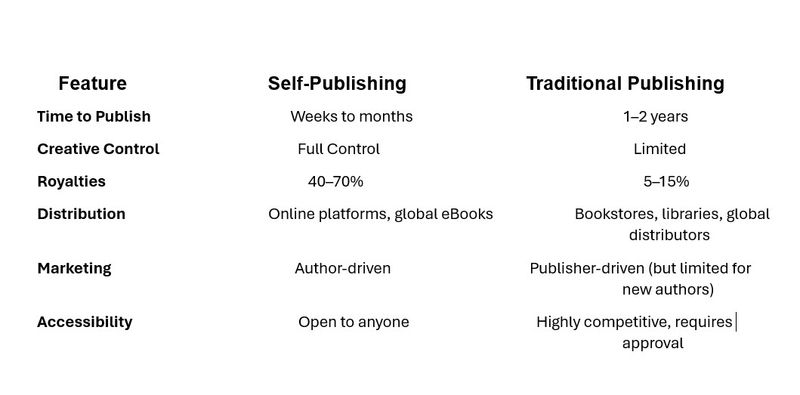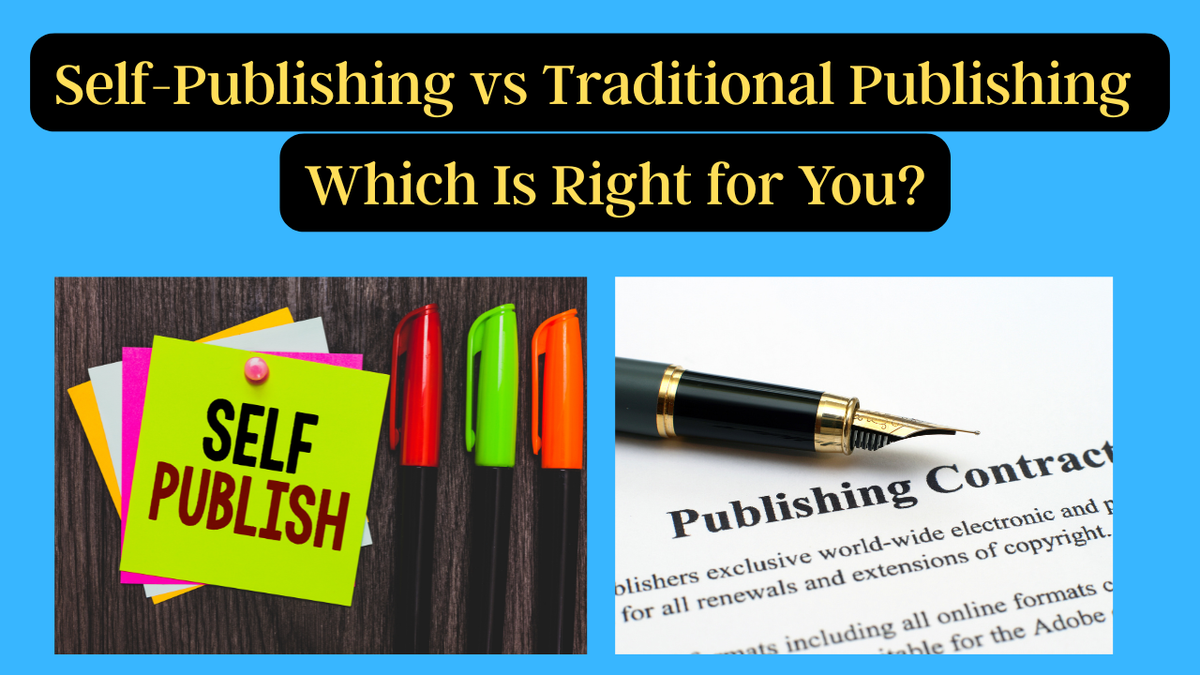Self-Publishing vs Traditional Publishing: Which Is Right for You?
Here is an overview of the write-up of the comparison between self-publishing versus traditional publishing.
1. Traditional Publishing
2. Self-Publishing
3. Key Differences (Self vs Traditional)
4. Key Differences (Self vs Traditional)
5. Why ITAN Global Publishing Matters
6. Which Option Is Best for You?
Now, the article in full....
Self-Publishing vs Traditional Publishing: Which Is Right for You?
Publishing a book has never been more accessible. Today, authors face two main paths: self-publishing and traditional publishing. Both options have their unique benefits and challenges, and the best choice often depends on your goals, resources, and vision as a writer.
In this article, we’ll explore the key differences, pros, and cons of each, while also highlighting how platforms like ITAN Global Publishing are redefining self-publishing for African authors and beyond.
What Is Traditional Publishing?
Traditional publishing is the long-established model where an author submits their manuscript to a publishing house. If accepted, the publisher invests in editing, design, printing, distribution, and marketing. In exchange, the author usually receives royalties, but the publisher retains significant control and a large share of the profits.
Pros of Traditional Publishing
1. Credibility and Prestige – Being published by a well-known publishing house adds instant credibility.
2. Professional Support – Access to expert editors, designers, and marketers.
3. Wider Distribution – Traditional publishers often have established networks with bookstores and libraries worldwide.
how-to-self-publish-a-book-in-nigeria-step-by-step-guide-for-new-authors
Cons of Traditional Publishing
1. Highly Competitive – Many manuscripts are rejected, making it hard for new authors to break in.
2. Long Process – From submission to publication can take 12–24 months or more.
3. Less Creative Control – Authors often have limited say over cover design, pricing, and marketing strategies.
4. Lower Royalties – Writers typically earn between 5–15% royalties per book.
how-itan-simplifies-the-publishing-journey-for-african-writers
What Is Self-Publishing?
Self-publishing empowers authors to take full control of their publishing journey. With digital platforms, writers can publish eBooks and paperbacks without relying on traditional publishers.
Companies like ITAN Global Publishing have created user-friendly platforms specifically designed to help authors—especially African writers—publish, distribute, and monetize their work globally.
Pros of Self-Publishing
1. Full Creative Control – Authors make all decisions regarding cover design, pricing, and marketing.
2. Faster to Market – Books can be published within weeks, not years.
3. Higher Royalties – Depending on the platform, authors can earn up to 70% royalties on sales.
4. Direct Connection with Readers – Writers build their own audience and community.
Cons of Self-Publishing
1. Upfront Investment – Authors may need to pay for editing, cover design, and marketing.
2. Marketing Responsibility – Success depends heavily on the author’s promotional efforts.
3. Competition – With millions of self-published titles, standing out requires strategy and persistence.
how-to-self-publish-a-book-in-2025-a-beginner-s-guide
Self-Publishing vs Traditional Publishing: Key Differences

Why ITAN Global Publishing Is Changing the Game
For many African writers, breaking into traditional publishing can feel almost impossible. That’s where ITAN Global Publishing comes in. As a self-publishing marketplace platform, ITAN gives authors:
1. A simple way to publish and distribute books globally.
2. Access to higher royalties, ensuring authors earn fairly.
3. Visibility tools to help African writers compete in the international market.
4. A supportive ecosystem where authors can connect with readers and other writers.
With ITAN, self-publishing is no longer just an alternative—it’s a powerful, future-ready choice for authors who want freedom, speed, and financial empowerment.
Which Option Is Right for You?
1. If you value prestige, patience, and are willing to share profits, traditional publishing might suit you.
2. If you want speed, control, and higher earnings, self-publishing—especially through platforms like ITAN Global Publishing—is the better route.
Final Thoughts
The debate between self-publishing and traditional publishing isn’t about which is better, but about which is better for you.
Today, with technology-driven platforms like ITAN Global Publishing, authors no longer need to wait for gatekeepers. Instead, they can publish on their own terms, reach global readers, and transform writing from passion to profit.
